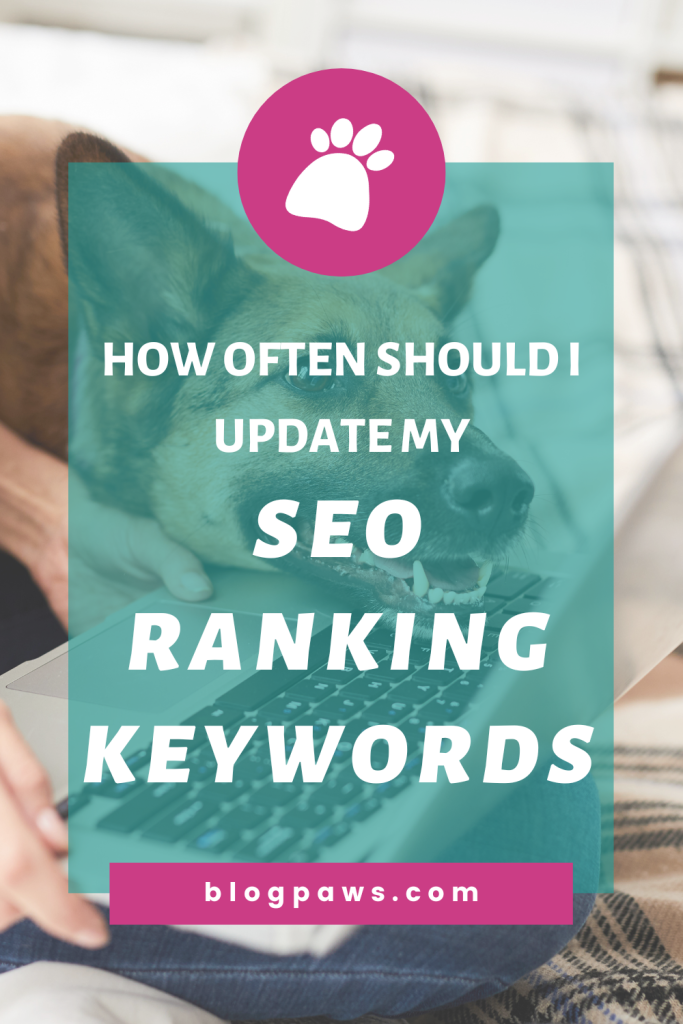How Often Should I Update My SEO Ranking Keywords?
Most entrepreneurs and business owners recognize that keyword research is an important first step in optimizing your content for SEO. What you may not realize is that search engine optimization isn’t a “once and done” effort. If you want to stay on page 1 for your top ranking keywords, you will need to revisit and update your content regularly.
Is this the first time that you are hearing about updating your older content for SEO? Have you been working on updating your content but aren’t sure about how often you should go through this process? Wherever you are in your business, we are here to help!
In this article, we’re going to look at why ranking keywords can change and why staying on top of these changes can help to boost your business success.

Understanding Ranking Keywords
To understand when and why you should change your keywords, let’s first look at the basics. What is a ranking keyword and how does it impact your website’s performance on search engines like Google?
A keyword is a specific search term or phrase that is being entered into a search engine. These can be simple queries like “hypoallergenic dogs” or “modern cat furniture”, longer and more in-depth phrases like “dog breeds that are well suited for apartment living”, or questions like “Why does my cat like to climb on furniture?”.
A ranking keyword for your website is a keyword or phrase that, when searched, will return your website as a result. The goal is to rank for keywords that directly connect with your product or service.
This is where the process of SEO optimization comes into play. When writing content for SEO, you are strategically using the keywords that you want to rank for in a way that will leverage the algorithm used by Google and other search engines. This means showing that your content is relevant to the search and provides valuable information to the person searching.
Tracking your ranking keywords will help you determine who is seeing your content organically. This will help you determine if you need to update a post to improve your ranking or if you have ranking keywords that aren’t going to help you reach the right people. For example, a dog treat company that is ranking for the phrase “red running shoes” isn’t going to attract people searching for their products.
What Causes a Keyword Rank Change?
There are several reasons why a keyword rank change can occur. Some of these reasons are within your control while others aren’t. However, understanding why they changed can help you to shift your focus when needed and continue to rank for the words and phrases that will best help you with your business goals.
Algorithm Changes
Search engines like Google are continually assessing their algorithms and updating them to improve the experience of those searching. In May 2022, Google announced a “core update” designed to improve the ranking process. When this happens, the factors that determine which websites will rank higher for each of their target ranking keywords will change. The changes may be minimal with some updates, but some of these algorithm changes will have a significant impact on your site’s performance.
While we can’t control when the algorithms are changed or updated, we can do our best to stay on top of these updates and adjust our content accordingly. This is one reason why it is so important to go back regularly and update SEO efforts on your posts.
Competitors
Of course, the competition for ranking keywords is just that – a competition. There are other businesses out there that are trying to rank for the same keywords and phrases that you are. If they are actively updating their content and improving their SEO, they may surpass you in rankings. This usually causes smaller keyword rank changes.
Changes on Your Website
Have you recently made changes to your website? Any change made to your website that could change the content or the speed that it loads has the potential to change how it performs. Page speed is one of the many factors considered in search engine results. Of course, it’s only one of many! But, if your site and another are close in their ranking, even a small change could give them the edge they need to outperform you.
On the other hand, content changes can be significant in your search performance both positively and negatively. Changing the content effectively changes the information you are providing the reader. This means search engines may deem that information to be less valuable (or more valuable) than it was before. Breaking it down further, you may accidentally remove keywords while rewriting copy on one of your pages. Alternatively, you may be able to rewrite something to offer greater value.
Shift in User Intent for Ranking Keywords
User intent is a factor that is often overlooked when it comes to discussing search engine optimization, but it can play a significant role in your site’s performance. When someone enters a query on a search engine like Google, they have a specific goal that they are hoping to achieve. This could be finding an answer to a question or a solution to a problem that they are faced with. The goal of the search engine is to provide them with results that meet that search intent.
To do this, search engines will pay attention to how users respond when browsing the result of their search. If those searching click on your website and then close it quickly or return to search to look at a different result, it shows that they didn’t find what they were looking for. However, if they stay on your site or your site is the last search result that they look at, that tells the search algorithm that your site delivers on search intent.
The search intent associated with a keyword or phrase can change. When it does, so too will the ranking associated with that keyword.
At the time that this article was written, if you search “dehydrated dog treats” in incognito (to remove any personalization in your results), you will find that most of the results on page 1 of Google refer to DIY or homemade dehydrated dog treats. This means that content that speaks to that intent is more likely to perform. But you may check that same phrase next year when reassessing your search performance and find that the results are mostly about where to purchase dehydrated dog treats. This would tell you that the search intent of most people entering that query has changed. As a result, the sites that rank for that search will also change.

How Often Should I Update SEO Keywords?
Now that you understand some of the main reasons why ranking keywords can change, you may be wondering what you can do to stay on top of your SEO efforts. Most experts recommend regularly reassessing your content and potentially doing an SEO or keyword update where necessary. This could involve updating your content to make sure that it is relevant and up to date, making changes to better optimize your content for SEO and the keywords that you are trying to rank for, or even deciding to change keywords.
But how often should you do this type of update? There is no one “right answer”. Instead, it will depend on the resources that you have available to go through this process and how much content you have. A solopreneur has many different tasks to complete within the business and may only have the time to update their content once a year. Whereas a larger company with a team working together may be able to assign someone to complete SEO assessments and updates, allowing them to look at their more popular content once each quarter.
The goal is to find a timeframe that works for you and commit to it. You can make this process easier for yourself by maintaining a content calendar and scheduling time specifically to work on updating older content for SEO.
Do you currently track ranking keywords and update your older content for SEO? If so, we would love to hear about your process!
About the Author: Britt Kascjak, BlogPaws Director of Content & SEO, is an award-winning freelance writer whose background in digital and social media marketing spans 15+ years. She’s been a content creator in the pet industry for 9+ years with her own blogs: Shed Happens, The Kas Pack, and Lucifer the Rescue Pup where she shares her life and outdoor adventures with her 2 dogs and 3 cats. Read more…



